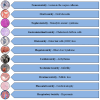The Therapeutic Mechanisms of Honey in Mitigating Toxicity from Anticancer Chemotherapy Toxicity: A Review
- PMID: 39189178
- PMCID: PMC11348124
- DOI: 10.3390/jox14030063
The Therapeutic Mechanisms of Honey in Mitigating Toxicity from Anticancer Chemotherapy Toxicity: A Review
Abstract
Within the domain of conventional oncochemotherapeutics, anticancer chemotherapy (AC) has emerged as a potent strategy for the treatment of cancers. AC is the mainstay strategy for solid and non-solid cancer treatment. Its mechanistic action targets the blockage of DNA transcription and the dysregulation of cell cycle machinery in cancer cells, leading to the activation of death pathways. However, the attendant side effect of toxicity inflicted by AC on healthy tissues presents a formidable challenge. The crucial culprit in the AC side effect of toxicity is unknown, although oxidative stress, mitochondrial impairment, inflammatory cascades, autophagy dysregulation, apoptosis, and certain aberrant signaling have been implicated. Honey is a natural bee product with significant health benefits and pharmacological properties. Interestingly, the literature reports that honey may proffer a protection mechanism for delicate tissue/organs against the side effect of toxicity from AC. Thus, this review delves into the prospective role of honey as an alleviator of the AC side effect of toxicity; it provides an elucidation of the mechanisms of AC toxicity and honey's molecular mechanisms of mitigation. The review endeavors to unravel the specific molecular cascades by which honey orchestrates its mitigating effects, with the overarching objective of refining its application as an adjuvant natural product. Honey supplementation prevents AC toxicity via the inhibition of oxidative stress, NF-κB-mediated inflammation, and caspase-dependent apoptosis cascades. Although there is a need for increased mechanistic studies, honey is a natural product that could mitigate the various toxicities induced by AC.
Keywords: adjuvant therapy; chemotherapy toxicity; honey; mitigation.
Conflict of interest statement
The authors declare no conflicts of interest.
Figures




Similar articles
-
Differential proteome and functional analysis of NSCLC cell lines in response to Tualang honey treatment.J Ethnopharmacol. 2022 Jul 15;293:115264. doi: 10.1016/j.jep.2022.115264. Epub 2022 Apr 6. J Ethnopharmacol. 2022. PMID: 35398242
-
Trace elements and metal nanoparticles: mechanistic approaches to mitigating chemotherapy-induced toxicity-a review of literature evidence.Biometals. 2024 Dec;37(6):1325-1378. doi: 10.1007/s10534-024-00637-7. Epub 2024 Sep 30. Biometals. 2024. PMID: 39347848 Review.
-
Manuka Honey Induces Apoptosis of Epithelial Cancer Cells through Aquaporin-3 and Calcium Signaling.Life (Basel). 2020 Oct 27;10(11):256. doi: 10.3390/life10110256. Life (Basel). 2020. PMID: 33120979 Free PMC article.
-
Effects of honey and its mechanisms of action on the development and progression of cancer.Molecules. 2014 Feb 21;19(2):2497-522. doi: 10.3390/molecules19022497. Molecules. 2014. PMID: 24566317 Free PMC article. Review.
-
Synergic Effect of Honey with Other Natural Agents in Developing Efficient Wound Dressings.Antioxidants (Basel). 2022 Dec 24;12(1):34. doi: 10.3390/antiox12010034. Antioxidants (Basel). 2022. PMID: 36670896 Free PMC article. Review.
Cited by
-
Physicochemical Properties, Antioxidant and Antibacterial Activities and Anti-Hepatocarcinogenic Effect and Potential Mechanism of Schefflera oleifera Honey Against HepG2 Cells.Foods. 2025 Jul 4;14(13):2376. doi: 10.3390/foods14132376. Foods. 2025. PMID: 40647128 Free PMC article.
-
From Chemical Composition to Antiproliferative Effects Through In Vitro Studies: Honey, an Ancient and Modern Hot Topic Remedy.Nutrients. 2025 May 6;17(9):1595. doi: 10.3390/nu17091595. Nutrients. 2025. PMID: 40362904 Free PMC article. Review.
References
-
- Anand U., Dey A., Chandel A.K.S., Sanyal R., Mishra A., Pandey D.K., De Falco V., Upadhyay A., Kandimalla R., Chaudhary A., et al. Cancer chemotherapy and beyond: Current status, drug candidates, associated risks and progress in targeted therapeutics. Genes Dis. 2023;10:1367–1401. doi: 10.1016/j.gendis.2022.02.007. - DOI - PMC - PubMed
-
- Famurewa A.C., Aja P.M., Maduagwuna E.K., Ekeleme-Egedigwe C.A., Ufebe O.G., Azubuike-Osu S.O. Antioxidant and anti-inflammatory effects of virgin coconut oil supplementation abrogate acute chemotherapy oxidative nephrotoxicity induced by anticancer drug methotrexate in rats. Biomed. Pharmacother. 2017;96:905–911. doi: 10.1016/j.biopha.2017.12.008. - DOI - PubMed
-
- Zhou P., Wang Z., Chen C., Famurewa A.C., Olatunji O.J. Naringin ameliorates 5-fluorouracil elicited neurotoxicity by curtailing oxidative stress and iNOS/NF-ĸB/caspase-3 pathway. Open Chem. 2023;21:20230126. doi: 10.1515/chem-2023-0126. - DOI
Publication types
LinkOut - more resources
Full Text Sources

